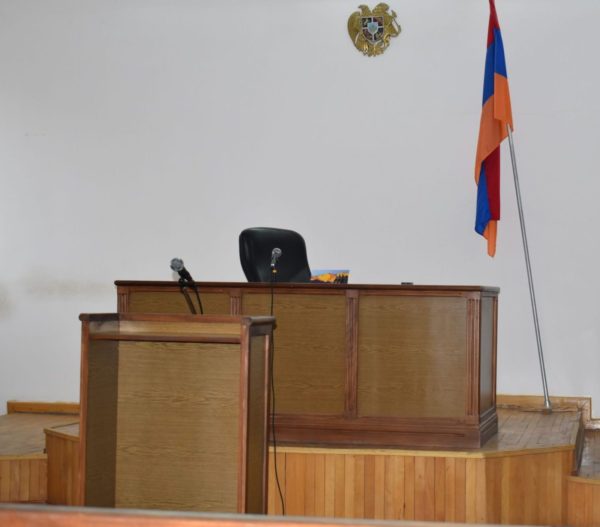In 2020, Y.H. applied to HCA Vanadzor and informed that Dilijan Police Department policemen manifested unfair attitude towards him by preparing a protocol stating as if he had broken movement restriction rules made by the Commandant during the state of emergency.
On 25 March 2020, Y.H. transported 2 passengers in his passenger car, while, according to the relevant decision of the Commandant, he had the right to transport 2 persons, including himself. Also, none of them had a movement sheet. Based on this, Dilijan policemen made an administrative act with a fine of AMD 100,000. Later, based on the legislative changes of fine reviews, the Police, too, reviewed their previous decision and on 18 June 2020, made a new one, by which a fine of AMD 10,000 was set instead of AMD 100,000.
Exercising the right to effective judicial protection envisaged by the RA Constitution and being sure that an unlawful obligation was imposed on him to pay a big fine, Y.H. applied to Court with the support of HCA Vanadzor.
Finding that the policemen’s act was unlawful and pointless and that it contradicted the RA legislation on restriction of human rights, Y.H.’s defender, HCA Vanadzor advocate Samson Galstyan asserted in the court that it was subject to being repealed.
According to him, the body that adopted the administrative act (which is, in this case, the police) did not implement proper administration. Thus, S.Galstyan requested the Court to uphold the claim.
As the advocate asserts, “According to the RA Law on Fundamentals of Administration and Administrative Procedure, invalid shall be the unlawful non-void administrative act, which was adopted in violation of law, including as a result of incorrect application or incorrect interpretation of the law”.
In this case, Head of Police Dilijan Division of Tavush Marz Department incorrectly applied the rules published by the Commandant and recorded as if Y.H. made an administrative violation by not observing the Commandant’s rules on restriction of free movement. Factually, the Police made an administrative act not stemming from the RA legislation.
Per HCA Vanadzor advocate S. Galstyan, the administrative act not only does not stem from the requirements of the RA Constitution and laws, but it also contradicts the whole essence of the RA legislation on human rights restriction.
Invoking the relevant provisions of the RA Constitution, RA Law “On RA Administration and Administrative Procedure” and RA Law “On the Legal Regime of the State of Emergency”, the advocate presented substantiations in the administrative appeal regarding the following, “Are the rules publicized by the Commandant regarding restriction of movement during the state of emergency conditions compulsory for persons or not, and did the policemen have the right to bring the citizen to administrative liability for breaking the rules defined by the Commandant?”.
The advocate considers that the Commandant’s Office has the power only to manage and control the forces ensuring the legal regime of the state of emergency and the events organized by them. A number of constitutional norms make it apparent that the exclusive right to restrict a person’s right to move freely is reserved only to the legislative body, i.e. the National Assembly.
According to the administrative act of 25 March 2020, the essence of Y.H.’s misdemeanor was that he did not adhere to the rules published by the Commandant in the state of emergency conditions.
When making the judgment, the Court also took into account a number of conditions that greatly affected the outcome of the case.
In particular, the court analyzed the Commandant’s rules on restriction of movement in the state of emergency conditions in order to find out whether they are compulsory for persons or not and whether the RA Police had the right to fine Y.H. for not observing the rules established by the Commandant.
The Court paid particular attention to the Commandant’s decision N 27, appendix 1, clause 1, which restricts persons’ right to move freely on the whole territory of the Republic of Armenia and establishes a compulsory self-isolation in their permanent residence place or any place of their choice to restrict direct communication with other persons and to prevent the spread of the virus. The self-isolation place chosen by the person cannot be changed until the term set by this decision expires.
In the frame of this decision, the Court noted that the RA Constitution does not envisage any regulation or law giving the Commandant’s Office the power to adopt such normative legal acts that can restrict a person’s free movement.
The provisions of the RA Constitution, the European Convention for the Protection of Human Rights and Fundamental Freedoms and the Universal Declaration of Human Rights clearly enshrine that in the established cases, the exclusive legal power to restrict a person’s rights is reserved solely to the legislative body, i.e., the National Assembly.
As long as the NA has not accepted a law on persons’ movement, these rights cannot be restricted. Moreover, one cannot be held administratively liable for exercising their constitutional right to move freely.
It turns out that without any legal regulation, the Commandant violated the imperative requirements of the RA Constitution norms. He reserved himself the right to make decisions containing rules of conduct compulsory for everyone, without taking into account that such a power is only given to the NA. The Commandant’s Office only has the power to ensure and control the legal regime of the state of emergency.
Combining a number of articles and provisions of the RA legislation, the Court found that Dilijan policemen did not have the legal power to hold Y.H. administratively liable.
According to Article 57 part 1 of the RA Law “On fundamentals of administration and administrative procedure”, “Written administrative act or administrative act confirmed in writing shall contain justification where all substantial factual and legal grounds for the issuance of the decision shall be mentioned”.
Based on the comprehensive analysis of all the circumstances, the RA Administrative Court, presided by judge Hrach Ayvazyan, concluded that there are all the legal and factual grounds to recognize the administrative act invalid.
On 11 November 2020, the Court upheld HCA Vanadzor advocate S. Galstyan’s claim. The above-mentioned decision made by Tavush deputy police chief, Y.H. was exempted from the obligation to pay the fine.




